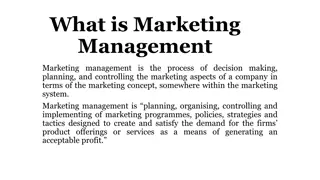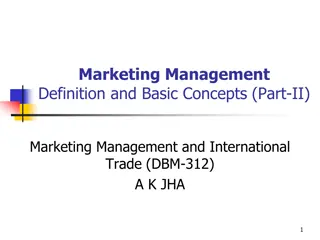Overview of Marketing Management Strategies
Marketing management is defined as the art and science of choosing target markets to acquire, retain, and grow customers by providing superior value. The importance of marketing management lies in building brand equity, boosting sales revenue, launching new products, engaging customers effectively, and providing actionable business insights. Key processes include market research, setting objectives, developing strategies, creating marketing plans, and implementing them to achieve business goals.
Download Presentation

Please find below an Image/Link to download the presentation.
The content on the website is provided AS IS for your information and personal use only. It may not be sold, licensed, or shared on other websites without obtaining consent from the author.If you encounter any issues during the download, it is possible that the publisher has removed the file from their server.
You are allowed to download the files provided on this website for personal or commercial use, subject to the condition that they are used lawfully. All files are the property of their respective owners.
The content on the website is provided AS IS for your information and personal use only. It may not be sold, licensed, or shared on other websites without obtaining consent from the author.
E N D
Presentation Transcript
Definition: Philip Kotler and Kevin Lane Keller define it as follows: Marketing Management is the art and science of choosing target markets and getting, keeping, and growing customers through creating, delivering, and communicating superior customer value. Importance of Marketing Management A good marketing management strategy helps you build the brand and grow sales and gives you an edge over competitors. Here are a few reasons why marketing management is essential: Build and maintain the company s brand Boost sales(revenue) An opportunity/platform to launch new products Effective way of engaging customers Acts as a communication channel Provides actionable insights for the business
Processes Involved in Marketing Management There is no standard process that an organization or one can follow when it comes to marketing management. But here are a few processes that most of the marketing management strategies have: 1. Conduct market research and analysis The first step in the marketing management process is knowing your customers and competitors by conducting market research and analysis. This can be done by completing surveys, collecting data, assessing industry trends, and tracking previous campaigns. A SWOT analysis can also be conducted to understand the business/company. Basis all this, you can understand the customer s needs and pain points to offer a product or service that meets their demands. 2. Set mission statement and objectives Although processes are important than outcomes, it is essential to know what are the expected results first. It is crucial to set objectives and goals as they give the foundation and set the right direction for your marketing journey. The marketing objectives can be set basis the factors that influence your target market, such as demand, pricing patterns, social and environmental factors, etc. It is vital to include sales goals, budgets, and branding parameters as they help you monitor and measure the results later.
3. Develop marketing strategies Once you have done the research and have set the objectives, it is vital to develop a robust marketing strategy. Marketing strategy typical consists of: Segmentation: Here, you are dividing the market to identify potential customers who are likely to buy your product/service. Targeting: Here, you will further sub-divide the segments and focus on a particular target. Positioning: This comes in mainly for brand building/positioning, where your brand s image is positioned in terms of quality and price. Marketing mix Here, focusing on 4Ps product, price, place, and promotion to achieve broad business goals. Budgeting/Financials Here, you will focus on the overall budget allocation and financial management of your product/service.
4. Curate an actionable marketing plan Once a marketing strategy is planned, the next step is to create an actionable marketing plan. Here you will focus on the period and develop a marketing calendar. This will be a go-to plan for anyone in the team to analyze and keep track of the progress. 5. Implement a marketing plan Implementation is one of the essential marketing management processes. Putting your marketing plan into action and executing it to achieve business goals. The implementation is generally kick-started by spreading awareness to your customers about your product/service by sales, PR, social media, or advertising. You can allocate the resources and budgets as per the plan. One must follow the procedure to achieve planned outcomes. 6. Monitor, Measure, Modify and Evolve The final stage is to monitor, analyze and track the progress. Here you will look at various parameters such as sales, revenue, customer feedback, brand positioning, no. of website visitors, the engagement rate on social media, and various other parameters basis the marketing plan and set objectives.
Marketing Management Job Roles There are various job roles available for Marketing Professionals. Here are a few of them: Digital Marketing Manager Product Marketing Manager Content Marketing Manager Brand Marketing Manager Social Media Marketing Manager Growth Marketing Manager Thank You

























